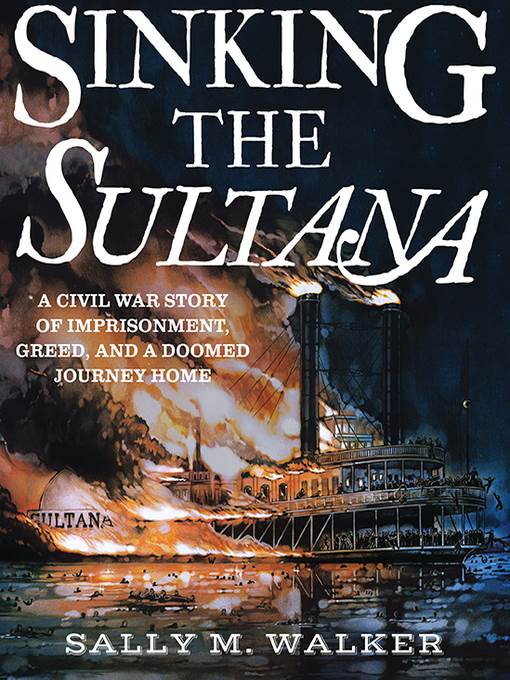
Sinking the Sultana
A Civil War Story of Imprisonment, Greed, and a Doomed Journey Home
فرمت کتاب
ebook
تاریخ انتشار
2017
Lexile Score
1090
Reading Level
6-9
ATOS
7.7
Interest Level
6-12(MG+)
نویسنده
Sally M. Walkerناشر
Candlewick Pressشابک
9780763697631
کتاب های مرتبط
- اطلاعات
- نقد و بررسی
- دیدگاه کاربران
نقد و بررسی

Starred review from October 9, 2017
Drawing on letters, diaries, and other eyewitness accounts, Walker (Winnie) delves into America’s worst maritime disaster: the 1865 sinking of the steamboat Sultana near Memphis, Tenn., with more than 2,000 paroled Union prisoners aboard. Beginning by detailing modifications to steamboat construction that allowed for Mississippi River navigation, Walker thoroughly investigates this forgotten disaster, whose loss of life exceeded that of the Titanic. She paints not-always-flattering portraits of key Army personnel and the crew, soldiers, and passengers aboard the luxurious Sultana, reconstructing—almost hour by hour—the crucial loading of the soldiers onto the ship and the aftermath of the boiler’s explosion. Replete with vivid details, including the terrible conditions in Confederate prisoner-of-war camps, Walker’s engrossing narrative builds to a horrific description of the terrified passengers’ actions and ensuing civilian rescue efforts. Although Walker conveys astonishment, even outrage, that no one was held responsible for this tragedy, she presents the evidence with an even hand. After closing everyone’s story, she exhorts readers to apply the lessons from this preventable catastrophe to the present day. Period photographs, maps, a glossary, source notes, and bibliography are included. Ages 10–up.

September 1, 2017
Gr 7 Up-A comprehensive recounting of the devastating but largely overlooked explosion of the Civil War-era steamboat, the Sultana. In April 1865 the Sultana set off along the Mississippi River, loaded with an excess of 2,000 passengers, including civilians and formerly imprisoned Union soldiers. In addition to the sinking, Walker details peripheral events and factors, such as the appalling conditions at Confederate prisoner camps, which the Union soldiers were desperate to escape from; steamboat officers competing to make a profit; a shoddy last-minute repair to the boat's boiler; and the subsequent investigation, which failed to hold anyone accountable for the disaster. Walker includes numerous first-person accounts, adding an emotional depth to the narrative, although the extensive cast of characters is sometimes hard to keep track of. Diagrams, maps, and photos throughout help clarify technical descriptions and ground readers in the time period, and asides are featured sparingly to detail relevant topics, such as steam power technology. The extensive back matter makes this a valuable source for research. Readers who have already devoured the abundance of material on the Titanic will be drawn to the story of the Sultana, which despite being the "worst maritime disaster in American history" is often overshadowed. VERDICT A riveting and informative addition to nonfiction collections.-Jessica Agudelo, New York Public Library
Copyright 2017 School Library Journal, LLC Used with permission.

September 1, 2017
The worst maritime disaster in American history, one that could have been easily prevented, is comprehensively recounted in this briskly paced narrative. On April 27, 1865, the Sultana, a Mississippi River side-wheel steamboat, exploded just north of Memphis on the Mississippi River. The boat, which had a capacity of 376, was carrying over 2,000 passengers, most of them Union soldiers recently released from prisoner-of-war camps. When the Sultana's boilers exploded, passengers were bombarded with red-hot iron fragments, burned by scalding steam or fire, and flung overboard into the cold, churning Mississippi River. Despite rescue efforts, over 1,500 lives were lost. The narrative focuses on five survivors. Walker chronicles their experiences in battle and as prisoners of the Confederates, their ordeals in the disaster and rescue, and what became of them after. She also discusses the official investigation into the disaster. The cause of the explosion was a damaged boiler that had not been properly repaired. Bribery was responsible for the gross overcrowding aboard the Sultana, but no one was ever held responsible or punished. In addition to archival illustrative material, Walker makes extensive use of primary sources, such as diaries and newspaper reports, although it is surprising more use is not made of the survivors' recollections Chester Berry collected and published in 1892. Quibbles aside, a finely detailed, well-researched chronicle of a little-known disaster. (maps, glossary, source notes, bibliography, index) (Nonfiction. 10-14)
COPYRIGHT(2017) Kirkus Reviews, ALL RIGHTS RESERVED.

September 1, 2017
Grades 7-12 It may surprise many to learn that the worst maritime disaster in American history was not the sinking of the Titanic. It happened 47 years prior, but the story begins during the Civil War, when the prisoner exchange system ended and the Andersonville prison camp swelled with Union soldiers. Once the war ended, these prisoners needed to be returned home, and transporting troops became a lucrative business for steamboats along the Mississippi River. Walker sets the scene for the Sultana disaster as she describes the captain's greed (allowing 2,400 passengers when the legal capacity was 376), the chief engineer's decision to repair rather than replace a deteriorating boiler, the flooded river, and other factors that would come into play. She tells the story through the lens of select soldiers and paying passengers, who each met different fates aboard the steamer. The author not only relates the aftermath of the tragedy that claimed 1,537 lives but also why it was almost forgotten. History buffs, and even adults, will be the biggest fans of this crossover YA title.(Reprinted with permission of Booklist, copyright 2017, American Library Association.)

























دیدگاه کاربران